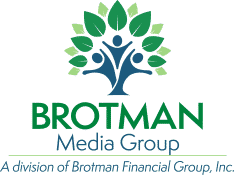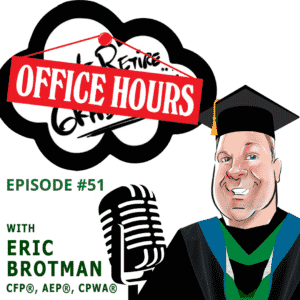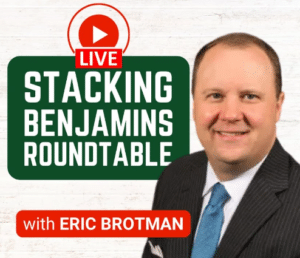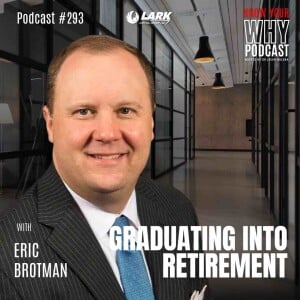In today’s Office Hours, Eric answers Felix’s question: what is the most valuable employee benefit I should take advantage of?
This is a great question and the answer varies by person, but there are a few employee benefit options that most people underutilize and even ignore.
Have a question? Post it in the comments, tweet it to us at @BrotmanPlanning, or post it on our Facebook and it may be used in a future episode of Office Hours!
[00:00:00] Eric Brotman: This is Eric Brotman, the host of Don’t Retire… Graduate!: The podcast that teaches you how to advance into retirement rather than retreating. Welcome to Office Hours where we answer listeners’ questions about personal finance, retirement readiness, and more. We received a question from Felix who asked, “what is the most valuable employee benefit I should take advantage of?”
And Felix, I love this question. Sadly, I can’t give you a single answer because everyone’s different, but I will tell you the employee benefits I think most people under-utilize and under consider. Number one is the health savings account, the HSA, and we’ve done shows on this in the past, and I’ve certainly written about the HSA.
I think the health savings account is the perfect tax planning tool because it’s the only account available to American citizens that allows you to take a tax deduction for your contributions, grow the money and invest it tax deferred, and make tax free withdrawals as long as they’re used for medical care. And you don’t have to use it or lose it like a flexible spending account. So I would say the number one most valuable employee benefit usually, or at least the one people can use and get the most value out of and don’t is the HSA. The next thing I would say, Felix is disability insurance. Particularly long-term disability insurance, for most employers, have multiple options here and there’s usually an employee cost to them.
But for most folks it’s particularly modest and it’s most important for the youngest employees because you have the longest career in front of you. So even though it’s ridiculously inexpensive, it’s also incredibly valuable. So it’s one of those bizarre things where it costs less and is worth more when you’re younger.
But if you have the ability to get disability insurance through your employer, long-term disability, it’s designed to pay you usually after 90 days or 180 days of being out of work for potentially as long as you live, or at least until you’re 65 years old. So if you’re 27 and you have coverage until you’re 65, that’s very significant.
You want to make sure when you do the disability insurance through your employer that you use post tax dollars to fund it. Don’t take a tax deduction for your disability premiums, because if you forego the tax deduction on the few dollars a check, that means your benefit when it comes, should you need, it would be income tax free.
And so that’s significant. You should be able to get between 60 and 70% of your income covered and if you’re not paying income taxes on that, that should basically replicate your lifestyle. So I would say that’s very important and people miss it. And the next thing on employee benefits, a lot of folks don’t realize that their employers have reimbursement programs or education programs that either allow you to pay student loans and still get a match to your 401k.
Or that allow you to get some reimbursement for education. And there’s a lot of money that particularly large employers leave on the table every year because the employees just either don’t know about it or they’re aware, but don’t take advantage of it. So much the same way when you’re applying to colleges, you have to dig a little to find those scholarships and grants.
I would say, take the time to read your employee benefit handbook. It might be 30 pages. But read it and understand it because some of the, some of the fine prints, some of the little things that that are toward the back on page 27 could be incredibly impactful to you. And people just don’t think about it.
Most people elect their health insurance plan. They, they may set their beneficiaries on the life insurance. They certainly enroll in their 401k or whatever retirement plan there is, and they pretty much don’t do anything. And so w w I think you should take advantage of all of the various benefits.
HSA would be at the top of the list. Disability insurance would be shortly thereafter, and then the rest of them will be individually tailored to you. If you have a financial advisor, ask your financial advisor to look at your benefit handbook and say, how do I elect this? What makes the most sense, given what you know about me financially. If you’re married and you and your spouse, each have employee benefits available to you, take the time to think about which health plan makes more sense, particularly if you have children. Should we all be on one plan? Should we be splitting this? What’s the best way to utilize what our employers are willing to pay towards our benefit care. And I think if you take the time to do it, you’ll be rewarded pretty handsomely for doing so.
So Felix, great question. Thank you so much for asking. If you’d like to send us a question, which we might answer in a future episode of office hours, post it on our Facebook page or tweet us at Brotmanplanning. If you like, what you hear, please subscribe to our podcast and leave a rating on Spotify or wherever you listen to your favorite shows.
Please also check out our books, workbooks and online financial literacy resources at brotmanmedia.com. Thanks for coming to office hours. Be sure to tune in for new content every Thursday. For now, this is your host, Eric Brotman and reminding you don’t retire, graduate.







